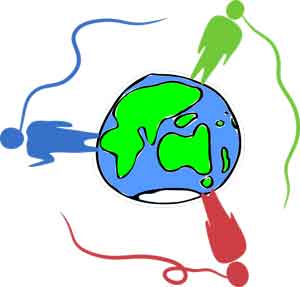Often times people use the terms “interpreting” and “translating” interchangeably, even though there is a stark difference between the two. While translation services involve converting languages into other languages through written text, interpreting consists of relaying information between languages verbally. Interpreter services are extremely valuable in continuing a conversation between two or more parties that speak different languages.
Interpreter Services Are More Common Than You Might Think
Interpreting is the process of converting the words, emotions, and tone of a spoken language into another language orally. It is used in many instances today, and can be considered commonplace in business meetings, interviews, and court proceedings in which a language barrier is present.
There are also many professions that require interpreter services. Interpreters assist professional athletes, heads of state, lawyers, community members, and high ranking company executives to name a few.
There are different modes of interpreting that are used depending on the situation (consecutive, bilateral, simultaneous and whispered to name a few), and the actual act of interpreting in any of these modes is in fact quite difficult.
Interpreters must be able to accurately decipher and render precise connotations and meanings from one language into another language in a very short time frame. This is because the information must be interpreted for the audience, while allowing for the flow of a conversation to continue without long and awkward pauses.
The History of Interpreter Services

Interpreter services were also used during the time of Spanish Conquistador Hernán Cortés in the 16th century, when Cortés had La Malinche serve as his interpreter during his conquest of the Aztec Empire.
Perhaps the most recent well known instance of interpretation in modern international diplomacy, was in 1945 with the start of the Nuremberg trials.
During the trials interpreters rendered the proceedings of German Nazis to an international audience in real time.
For the first time, interpreters conducted work simultaneously and transmitted their interpretation through headsets to the audience.
Learn More About Simultaneous Interpreting ->
Learn More About Interpreting Equipment ->
Elements of Interpreter Services
There are a variety of factors at play during the process of interpretation. The central factor is of course the interpreter. There is also the first source language speaker, and the second target language speaker, who will be receiving the interpreted messages.
The source language is the language from which the interpreter interprets, and the target language is the language presented for the audience.
Together, the source language and target language make up what is known as a language pair.
Interpreters can have multiple language pairs depending on their skill level. United Nations interpreters for example must be able to speak two of the official languages of the UN, as well as their native language.
Cognitive Skills and Focus

For instance, with simultaneous interpretation, interpreters must be able to concentrate on the source language being spoken by the speaker and render his or her messages in the target language at the same time.
Consecutive interpreters need to listen to whole thoughts presented by the source language speaker, remember them, and then render them precisely to the target language recipient.
Without sharp cognitive skills from an interpreter, a conversation cannot be sustained between two speakers, or between a speaker and a target audience. Precise focus and attention is necessary for all the different modes of interpretation.
Interpreter Services Costs
Although interpreting services are extremely advantageous for communicating across language barriers, they are nonetheless very expensive.
- In-person interpreter costs: range from $50 to $145 per hour
- Phone interpreter costs: range from $1.25 to $3 per minute
- Video interpreter costs: vary from $1.75 to $7 per minute
Often times there is a minimum amount of time charged when hiring an interpreter, as on site interpreters themselves usually have a 2-3 hour minimum.
Additional Costs of Interpreter Services

1. Travel: Travel time for interpreters is commonly billed as an extra fee; interpreters working with the Arkansas Courts, for instance, charge 45 cents per additional mile they must travel to an assignment, and an extra $40 per hour for travel outside of their designated county.
Agencies often coordinate an interpreter’s travel and lodging for the client, and as such bill those items separately.
2. Technicality of Material: Interpreter costs also increase as the technicality of the meeting material increases. The more advanced the subject matter, the more likely it is you will need an interpreter with advanced degrees, certifications and experience. These interpreters usually have a higher rate.
Interpreters needed in day-to-day settings for communicating with people are usually cheaper.
3. Language Pairs: It’s not only the technicality of the language, but the actual language pairs themselves that can drive up prices. The rarer the source language or target language is in your area, the harder it will be to find an interpreter. At times, interpreters are flown in from other countries to satisfy client needs, increasing travel expenses.
Language Connections Interpreting Services
Language Connections has been providing interpretation services for over 20 years. Our interpreters speak over 100 of the world’s major languages, and work across industries including the Life Sciences, Law, Business, Government, International Development, and Academia.
We provide on-site interpreters for meetings and appointments, as well as conference solutions and telephonic options.
Learn More About Our Interpreting Services:
- [VIDEO] Crash Course on the Different Types of Interpreting
- How To Choose An Interpreter
- Interpreting Services
- Conference Interpreting
- Telephonic Interpreting
Sources
- https://nilservices.com/situations-where-youd-need-a-professional-interpreter/
- https://www.altalang.com/beyond-words/2016/05/12/6-major-moments-translation-interpretation-history/
- https://www.mt-g.eu/fr/actualites-mt-g/package-insert/beipackzettel-archiv/2016/beipackzettel-39/a-brief-history-of-interpreting/
- http://smallbusiness.costhelper.com/interpreters.html#extres2
- http://www.bbc.com/future/story/20141117-the-ultimate-multi-taskers
About Language Connections:
Language Connections is one of the top language service companies in the US. Over the last 30 years, we’ve focused on providing the best business translation services, interpreting services, as well as interpreter training and customized language training programs. In addition to top-tier corporate language training, we offer certified corporate interpreters and professional business translation services in 200+ languages. Our network includes linguists with backgrounds in all major industries. They’re ready to meet your needs, whether they’re for technical translation services, legal translation, government translation services, international development translation services, education translation services, life sciences translation, or something else. Reach out to us today for a free quote on our cost-efficient and timely translation services, interpreters, or other linguistic services.
Language Connections Inc.
2001 Beacon Street, Suite 105,
Boston, MA 02135
Phone: +1-617-731-3510
Email: service@languageconnections.com


